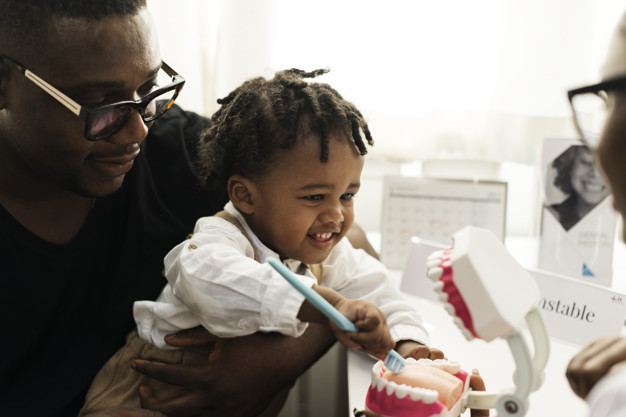Dentists' children, do they tend to be dentists?

Children of dentists, are dentists? At least they tend to be. See what a psychologist says about this situation.
It is natural and genetically proven that children inherit many physical or psychological traits from their parents. After all, things like values, responsibility, culture are passed from father to son, so why not the profession? And it is not difficult to find families that have followed the same career. In the month of World Dentist Day, October 25, the newspaper A CRÍTICA chose a family of dental surgeons to find out how they decided to choose the same profession as their father and how they share experiences, doubts, successes and failures and of course a lot of love for the profession.
This is the case of the children of dentist José Pinheiro da Silva, 55 years old. The middle, Danilo Noleto, 33, owns DNS Odontológica; like him, brothers Daniel Noleto, 35, and Diogo Noleto, 32, also graduated in the area. But it didn't stop there, the youngest Douglas Pinheiro, 23 and Gabrielle Noleto, 22, are also finishing their Dentistry course.
According to clinical psychologist and cognitive behavioral therapist, Karina Alecrim Bessa, parents often influence their children based on the example of their positive attitudes often observed by their children. Children tend to analyze everything that adults are doing and end up even unconsciously assimilating whether that is good or not as the security and hero figure sometimes dressed by profession. This happens a lot in the case of children who go to work together with their parents and even there, they build an image of the profession.
According to Danilo Noleto, this is the case for his family, as all of José Pinheiro's children have always been very involved in the laboratory and dental office environment from an early age. My father married very young and to support the family he worked at home together with my mother making dentures and even before he completed his dentistry degree we were already living with it and we realized that our livelihood came from there, he recalls, stressing that the first to venture into dentistry was his older brother, Daniel Noleto, which triggered a chain reaction.
Another strong reference in his memory was the army uniform worn by his father, shortly after he graduated and assumed the position of lieutenant dentist.
When my dad finished college and started serving in the army as a dental lieutenant, we lived on a street in the Santo Antônio neighborhood known for its huge hillsides. And there was a slope and the bus stop was about 50 meters from our house, every time he arrived from the barracks, we were anxious to jump on his neck and go down the slope hanging like monkeys. The scene was hilarious; Daniel on one leg, Danilo on the other and Diogo on his lap, was the happiest 50 meters of our life, recalls the surgeon.
For José Pinheiro da Silva, the family patriarch and responsible for this training of new dental professionals, being able to accompany his children following in his footsteps is a source of pride. I have a trajectory based on professionalism and seriousness and knowing that I positively influenced each one makes me very happy. Not only because they followed the same profession, but also because they are a source of inspiration for everyone, he observes.
Obligation is harmful
Unlike the case of the Noleto family, where everyone is happy to choose their father's profession, psychologist Karina Bessa says that it is still very common for children to follow their parents' profession obligatorily. According to her, many parents feel a desire, even unconscious, that their children, their descendants, follow their path, and perpetuate, in a way, not only their name, but also what they did and did to society.
Therefore, it is common to realize that some parents invite their little ones to accompany them to their work environment and this, to a certain extent, is very healthy. Even, because it tightens the bonds of the father and son relationship, he comments.
According to her, the important thing is that parents talk to their children about the different professions.
It is very nice for parents to invite and take their children to know their work environment, to talk about how their profession works, to comment on how happy they are to carry out that profession. But, other professions can also be brought into the family conversation, he points out. Karina says that in many cases this influence happens in a veiled way imposed by the home provider, who says to her son: “you didn't pass the entrance exam at the public university, I only pay for a college for you if you are from that area".
According to her, unfortunately, this still happens and specialists are still faced with several of these emotionally fragile young people in their offices. The important thing is that the parents talk about their professions, talk about how much they like to practice that profession and the reason why they feel happy to practice it. But let them leave their children free to decide which path to take. In some cases, help from a psychology professional is most welcome, he concludes.
Source: Vida de Dentista. Available at: https://vidadedentista.com.br/2019/06/filhos-de-dentistas-tendem-ser-dentistas.html. Access on: 10/15/2020.
